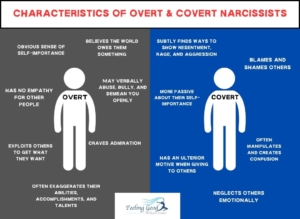Are You the Victim of Narcissistic Abuse? How to Break the Cycle and Heal.
Being in a relationship with a narcissist can be highly damaging to your mental health. Their narcissistic abuse may make you doubt your sense of self and cause you to question what’s real. They’ll make you feel like you’re “too sensitive” and “exaggerating” when you voice your pain. Your emotions are toyed with and diminished daily in your relationship, making you fear for your emotional well-being.
You don’t want the person you care about, the one you may even love, to treat you like this. But they invalidate your feelings and make you feel small. When you’re trapped in the vicious cycle of narcissistic abuse, breaking free is challenging. With no physical abuse, you are often left questioning your judgment and wondering if you are making it all up.
So you give in, and the vicious narcissistic abuse cycle continues. But you must understand that you are a victim. You’ve gone from being yourself to being a narcissistic supply and abuse victim. It’s likely led to mental health concerns like anxiety, depression, OCD, and PTSD.
It’s toxic. And you must break the cycle.
What Is Narcissistic Supply?
It’s important to understand that your significant other is not inherently evil. They didn’t choose to become a narcissist. On the contrary, narcissists are likely the way they are due to attachment disorders beginning in their childhood. When you grow up in a strong, loving environment with caregivers who provide the emotional and physical needs you require, you instinctively learn how to love and trust others.
But narcissists didn’t have this experience.
Narcissists likely had a troubled upbringing. They may have experienced neglect, physical or emotional abuse, or grew up in a disorganized, fearful environment. For this reason, narcissists go through life focusing on protecting themselves, even at the expense of others.
They don’t know how to connect to others healthily. Instead, they thrive on the attention, validation, and admiration of others. The self-protective survival skills narcissists should have developed in childhood aren’t there, so they unknowingly resort to the emotional manipulation of others to feed their sense of self-worth and ego.
This need, desire, and inability to connect with others in a healthy way has driven them to require affirmation from others, and they’ll do what they have to do to get it. That means they often get their narcissistic supply from other people when they are in a relationship.
They end up treating you like an object rather than a person. They’ll devalue your emotions and make you feel like you’re overreacting and do what they have to do to get you to stay with them. You are their narcissistic supply. Much like a drug, they are addicted to it.
And without proper professional help, it’ll be challenging for them to break the cycle and for you to free yourself from narcissistic abuse.
Personality Types Most Affected by Narcissistic Supply
It’s no secret that certain personality types are attracted to others. For narcissists, that personality type is trusting, respectful, honest, and compassionate. Narcissists gravitate towards this type of person because they know they can get what they need from them. However, making you their source of narcissistic supply comes at a price.
The most affected personality type embodies all of the above qualities at a higher level – the empath.
An empath isn’t merely someone who has empathy and compassion for others. They experience the feelings of others as if they were their own. In a narcissistic abusive relationship, this can be very damaging to the empath’s mental health.
Empaths possess an exorbitant level of compassion for others. If you are an empath and in a relationship with a narcissist, you’ll do what you can to help your significant other feel valued, loved, and cared for, often to your detriment.
A narcissist will take advantage of your compassion and ability to love unconditionally. They’ll exploit your need for love for their own fulfillment and not be able to recognize what they are doing as abusive and traumatic. They’ll demoralize you and use you as a scapegoat for their dysfunctional feelings. As an empath, you’ll internalize their abuse and accept their blame as fact.
This is what keeps you in the painful narcissist supply cycle. And you need to break it by either taking yourself out of the equation or trying to get the narcissist to take ownership of their behavior. Both of these options can be challenging. But with the right therapist by your side, rectification is possible if you both agree to it.
Covert vs. Overt Narcissists
There are two kinds of narcissists that can thrive off narcissist supply:
- Covert narcissists: These types of narcissists have a grandiose sense of entitlement and self-importance. Ironically, they often appear to be humble, shy, or even introverted. Covert narcissists tend to have a need for control and often manipulate and deceive.
- Overt narcissists: On the other hand, overt narcissists are attention-seeking and have an inflated ego. They are more subtle when seeking power. In other words, they present themselves as being humble while still maintaining a position of control over others.
Both types of narcissists lack empathy for others, have a strong sense of entitlement and grandiosity, and will manipulate you to get what they want, no matter how traumatizing it may be to you.
Signs of Narcissistic Abuse
When you are in a relationship involving narcissistic supply, your emotions are often being toyed with, so it can be challenging to determine if you are the victim of narcissistic abuse.
Here are some things to look out for:
- Gaslighting: Does your significant other make you doubt yourself and accuse you of lying or not understanding what “really” happened? Narcissists will deny any harmful behaviors or pretend things didn’t happen as they did.
- Love-bombing: One form of narcissistic abuse occurs when your significant other showers you with endless affection, compliments, and gifts. This may seem wonderful, but if they are a narcissist, they have ulterior motives. Love-bombing is how they earn your trust, leading to eventual control over you, your thoughts, emotions, and even your body.
- Ignoring boundaries: Your boundaries are essential. However, if you are in a narcissistic abusive relationship, you’re likely to be an empath or close to one. Empaths have trouble setting and maintaining boundaries. Narcissists know this and take advantage of that. They will ignore them entirely. And when you attempt to reinforce them, they’ll argue with you and hurl insults and accusations.
- Projecting: Narcissists often project their poor behaviors on you and shift the blame. This technique is referred to as DARVO – Deny, Attack, Reverse Victim, and Offender. What’s worse, they’ll deny any guilt and could damage your credibility.
- Criticizing: Narcissistic abusers will make you feel like everything you do, think, feel, or say is wrong. They may criticize your clothes, behavior, friends, job, overall appearance, or maybe even the sound of your voice.
I Can Help You Break the Cycle and Heal Through Online Counseling in California and Ontario
If your confidence and self-worth are shattered, you need professional guidance to build it back up and learn how to stand up to your narcissistic abuser. Chances are, you exhibit symptoms of PTSD, depression, and anxiety from the abuse. The good news is that there is hope. As an experienced, compassionate therapist, I provide high-quality online counselling in Ontario and California.
I can help you heal from the trauma you’ve experienced and set clear boundaries so you can heal. The negative effects of narcissistic abuse can run deep, but with a qualified professional on your side, there is a way out.
Contact me for more information about my online therapy in California and online counselling in Ontario. The sooner you get the help you need, the faster you can feel free from abuse.








